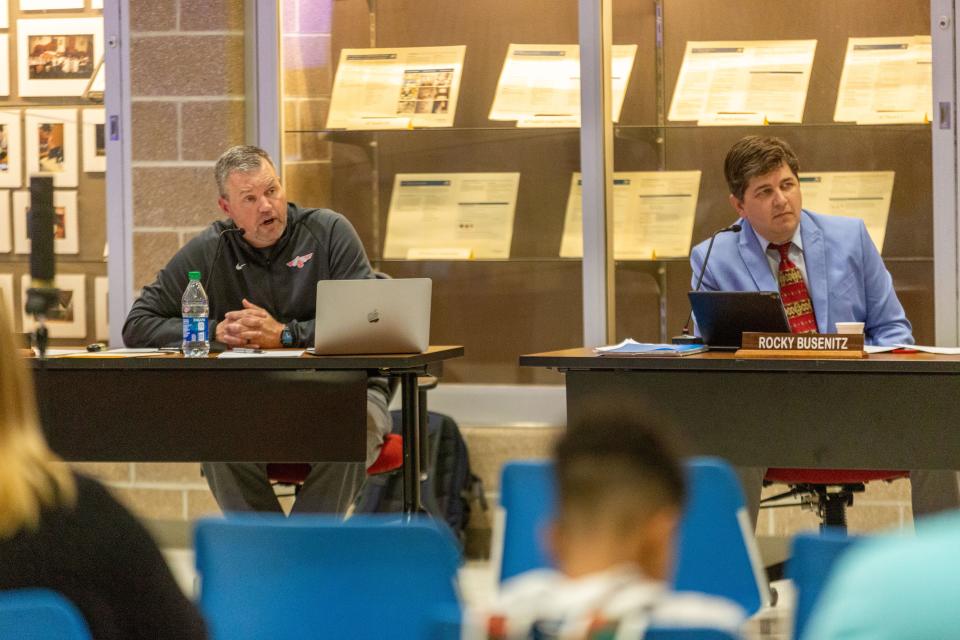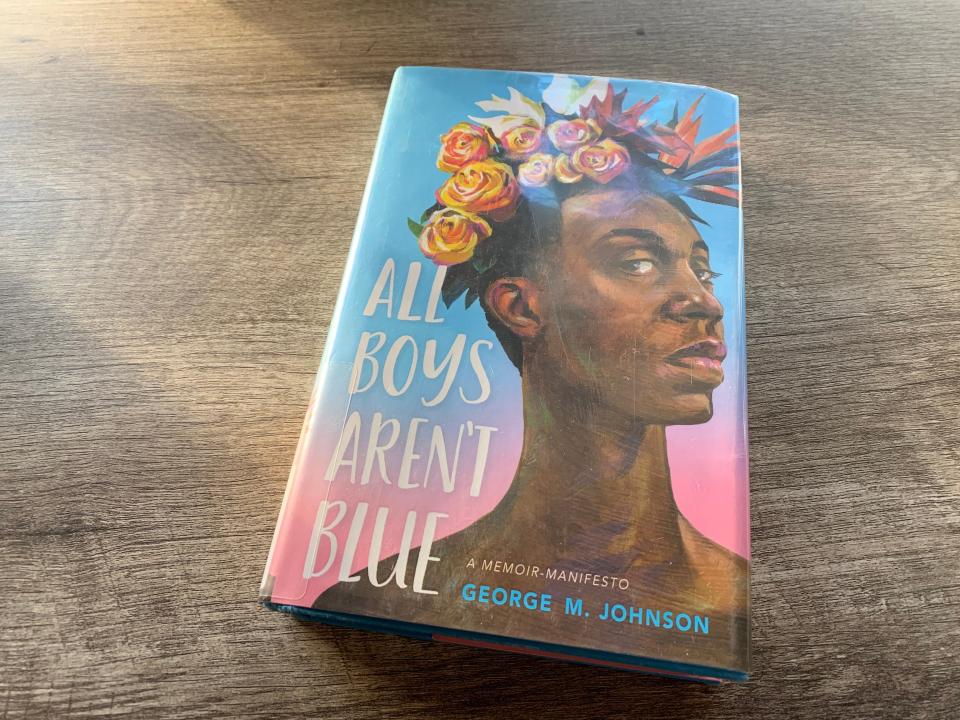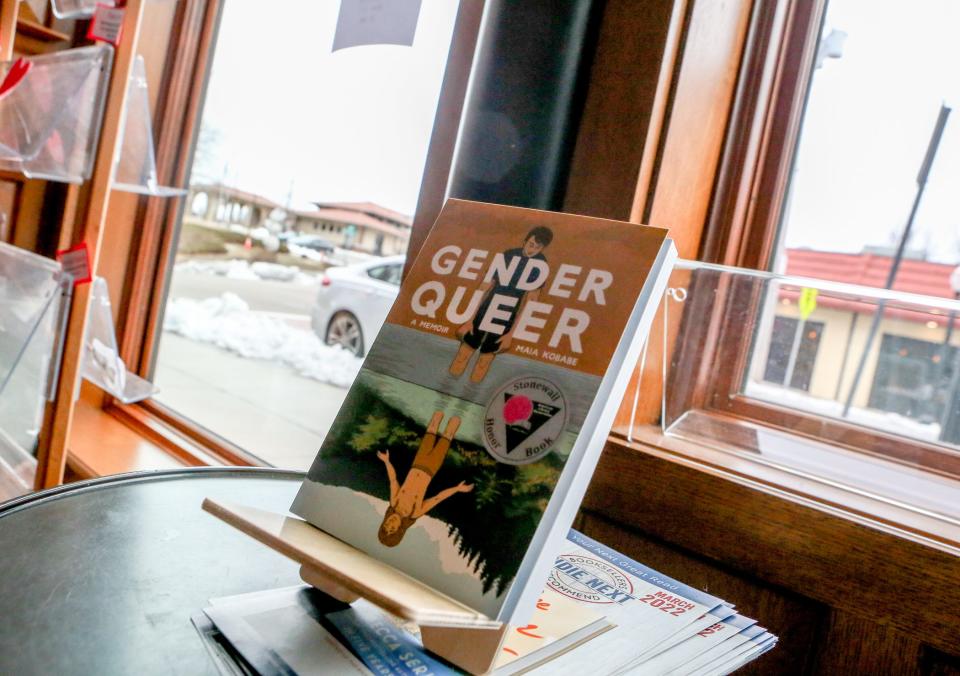After months of review, Shawnee Heights Board of Education votes to keep controversial books in schools

The five books that had been challenged in Shawnee Heights USD 450 school libraries will be allowed to remain on shelves, although some will come with heightened restrictions.
The Shawnee Heights Board of Education on Monday evening voted to largely accept the recommendations it had received on the five books from a committee of teachers, administrators and parents who had reviewed the books in question. It had been 24 years since the last time the district had to review a challenged book.
Four of the five books had been challenged in November 2021, while a fifth one — "Gender Queer: A Memoir" by Maia Kobabe — was added to the committee's review schedule in March.
More: Shawnee Heights among Kansas school districts divided on debate to ban 'inappropriate' library books
The books had ignited intense discussion and controversy in the Shawnee Heights community, particularly from parents and patrons who said the material covered in the books — some of which included graphic depictions and descriptions of sexual activity — amounted to obscenity that could even be prosecuted under state statute.
However, both the committee members and school board members ultimately decided that the valuable lessons and perspectives included in the majority of each of the books' pages ultimately outweighed the few offensive pages.
The committee, which was made up of two community members, two content specialists, one librarian and one administrator, was charged with the task of evaluating each challenged book in whole, considering its value and developing a recommendation on keeping or removing the book for the school board to vote on.
Stacey Bell, secondary curriculum director for the district, served as a liaison with the committee and presented on the group's findings at Monday's board meeting.
'Not My Idea: A Book About Whiteness' Anastasia Higginbotham

The first book presented was "Not My Idea: A Book About Whiteness" by Anastasia Higginbotham, currently in the Shawnee Heights Elementary Library. Since it was added to the library in 2018, it had only been checked out once by a student and four times by adults.
The book, geared at younger students, explores the concept of whiteness after a white child in the book watches a TV report about a white police officer shooting and killing a Black person.
The six-member committee evenly split on three recommendations: Two members recommended keeping the book while allowing parents to opt their kids from being able to check it out, two members recommended keeping it with age-level restrictions and two recommended removing the book entirely.
More: Kansas school can't block Christian teacher from outing transgender students to parents, judge rules
While much of the committee and board agreed that most of the book had content that parents could find questionable, at issue particularly was a passage at the end of the book, in which the main character is asked by the devil to sign a contract pledging them to whiteness.
The board ultimately voted 4-3 to keep the book but with parental restrictions, with board president Rocky Busenitz, Christina Flaming and Jason Schulz voting against the measure.
Flaming said she saw the book as trying to use "racism to fix racism," and that the book could lead children to have a perception of white officers as dangerous.
"We have two white officers right out here — police officers, both previously from TPD and Shawnee County," Flaming said, pointing to security for the board meeting. "The fact they're white officers does not make me concerned at all."
'Beyond the Gender Binary' Alok Vaid-Menon
The second book under review, "Beyond the Gender Binary" by Alok Vaid-Menon, met little resistance by either the committee or board.
Board members said that while reading some of the book's passages made them uncomfortable, it did so in a way that educated them about gender expression.
The board voted unanimously to keep it in the Shawnee Heights Middle School library.
'All Boys Aren't Blue' George M. Johnson

The committee's third book, "All Boys Aren't Blue" by George M. Johnson, saw five review committee members recommend to retain it, while a sixth voted to remove it because they objected to extreme sexual activity in the book.
Released in 2020, Johnson's book is a series of essays describing his childhood growing up a queer Black boy in New Jersey. This book in particular has been the subject of a nationwide campaign to remove it from school libraries for its depictions of oral sex, incest and statutory rape.
Like with the other books, most of the school board said they found the book's positive messages had value that outweighed questionable passages, and that the book could be useful for students who are questioning their own gender identities.
"It's a little rough in a few places," Schulz said of the book. "Life is a little rough in places, and the couple of issues that come up throughout the book should not diminish the overall quality of the book."
More: Should college credit be a barrier to putting substitute teachers in Kansas classrooms?
But Busenitz said he wasn't convinced the book rose above the Miller test, referring to three questions the U.S. Supreme Court developed in 1973 to determine what makes material or content obscene.
That test asks whether the average person would find a work, taken as a whole, meets the prurient standards of community interest; if the work describes sexual conduct in a patently offensive way; and if the work otherwise lacks serious artistic or literary merit.
"I thought the good that was done in pages one through 200 was wiped out by those three sections of unnecessarily graphic content," Busenitz said. "I think we as parents should have the expectation that when we send our kids to school, we're able to send them there without being exposed to sexual content without our consent or knowledge."
The board voted 5-2 to keep the book in the Shawnee Heights High School library and allow it to be checked out with parental approval, with Busnitz and Flaming opposed.
'The Hate U Give' Angie Thomas
In the instance of "The Hate U Give" by Angie Thomas, the book is in both the high school library as a circulation material, as well as ninth grade classrooms as a part of the freshman English curriculum.
The book tells the story of a Black teenager who sees one of her childhood friends, also Black, shot and killed by a white police officer and lives through the aftermath of protests and racial tension in her mostly-Black neighborhood and the reaction at her predominantly-white school. Board member Rosa Cavazos said she empathized with the main character's struggle to live in two worlds.
All members of the review committee recommended retaining the book in both the library and curriculum, especially since freshman are already given the option to read "To Kill A Mockingbird" instead.
While small sections of the book deal with the character considering underage sex, board members noted that the book dealt with it and the issue of obtaining consent positively.
More: More flexibility to Kansas' high school graduation requirements could be around the corner
What was more in question, for Flaming, was the way the book dealt with race relations, especially with having a "white cop on Black victim" situation.
"I understand that does happen," Flaming said. "However, anyone who's read the statistics knows there is more Black-on-Black (crime) than there is white-on-Black, if you get the statistics from the national organizations on crime. Despite the fact that these are hyper politicized issues, it's still far less than what the statistics are."
Flaming further argued that readers are led to believe all police officers are bad, especially without knowing the mental state of the officer in the book who "was put in a tough situation." In the book, an officer shoots and kills a Black teenager after the teenager reaches into his car for a hairbrush at a traffic stop.
Six board members voted to keep the book in the school library and curriculum, with Flaming abstaining from the vote.
'Gender Queer: A Memoir' Maia Kobabe

The last book Bell presented a recommendation on, "Gender Queer: A Memoir" by Maia Kobabe, was also the last book the committee had received for review, having been challenged over spring break.
The short graphic novel tells the story of how the author came to realize they were nonbinary and asexual, with controversy surrounding the book for a handful of drawings that critics have called pedophilic depictions of underage LGBTQ sexual activity.
The book caused the most division on the committee, with two members recommending to keep the book, two members recommending its removal, and other members recommending to put various restrictions on the material.
Board member Lauren Tice Miller said she understood many parents' concerns with the book, but she noted that the book has only ever been checked out four times in its time at the Shawnee Heights High School library.
She said any number of books, classical materials and even the state capitol have depictions of sex or nudity. She asked other board members if schools should just get rid of their libraries altogether.
"What goes next?" Miller asked rhetorically. "What else becomes limited? What if there is a sophomore who really needs to read this to find who they are and have that conversation with their parents?"
Miller, Schulz, Eric Deitcher and Erica Price voted to keep the book in the library with parents able to restrict their individual students from checking it out, while Busenitz, Flaming and Cavazos voting against.
Group of parents urged board to remove 'pornography' from Shawnee Heights libraries
In a public comment period ahead of the discussion and vote on the committee's report, several district patrons warned that the devil was at work in the district and the school board would be "stealing our children's innocence."
"I don't want any adult in here being exposed to this right now," Wendy Hilberman told the board during the public comment. "I worry for us being exposed. That devil is at work. If you think he's not, you're lying to yourself. I'm telling you the truth. You are stealing our children's innocence."
She cautioned that a vote to allow the book to remain in the Shawnee Heights High library would lead to an increase in teen pregnancy, single motherhood and abortion.
Worst case scenario, Hilberman said the board could find itself with a lawsuit on its hands for promoting obscene materials.
More: Kansas House fails to override vetoes on transgender athletes ban, parents' bill of rights
"You guys might be held responsible if one child is exposed to this material and they assault or sexually rape another child, because that's what this is promoting," Hilberman said. "Read the book, I wish you would, because I feel like I need to tell the officer, 'Officer, we have people promoting child porn here — what can we do?'"
Carrie Thompson, another district patron, said she understood and empathized with "a small number of children who are gender dysphoric," but she believed books like the ones in question were leading them down the wrong path.
"Gender dysphoria is not something to be glorified," Thompson said. "It is to be handled with love, understanding and education by the child's parents and counselors. While all kids should ideally feel welcome at school and accepted, I don't feel it is appropriate to encourage or promote this type of lifestyle, which is exactly what some misguided educators are doing."
She said people wanted to ignore the lessons of the Bible, but that "humans can't adapt laws of God because they do not deem them applicable to our generation."
Moving forward
At the conclusion of the votes on the individual books, Bell presented a few policy recommendations the book review committee had suggested the board consider over the summer.
The current policy on challenging books and instructional material allows any person to make a challenge, but the committee suggested the board limit that to any district patron.
Additionally, the committee suggested adding a step to the chain of command to allow a complaint about a book to be made with a teacher or librarian, and not just the principal. Principals, in their administrative roles, are often unfamiliar with specific books and might have to first read the materials in question before meeting with a complainant, adding in a potential delay to the the process.
More: Battle of the Books is the just-as-serious elementary school version of the War on 24
The committee also recommended creating separate levels of review for different ages of students, in addition to adding a student and an additional parent to the review committees, among other changes.
Since the committee requires the participation of staffers who are under school year contracts, the committee will be unable to review any materials over the summer, and they recommended the board amend its policy to adjust for that and to make its overall timeline more flexible, among other recommendations.
Superintendent Tim Hallacy said that while the district has always allowed parents to restrict their students from checking out certain books, that process has not been well defined in the past. A streamlined process and form is in the works, he said.
Rafael Garcia is an education reporter for the Topeka Capital-Journal. He can be reached at rgarcia@cjonline.com. Follow him on Twitter at @byRafaelGarcia.
This article originally appeared on Topeka Capital-Journal: Shawnee Heights USD 450 allows challenged books to remain in libraries

